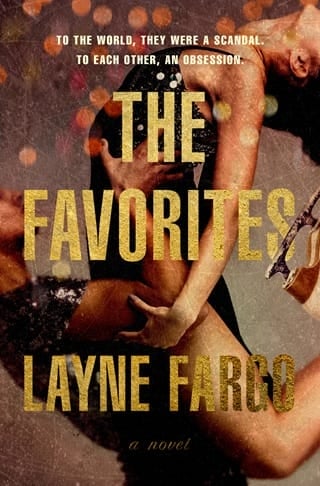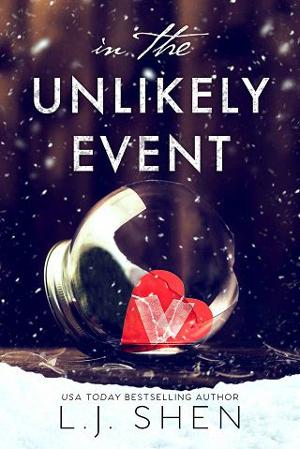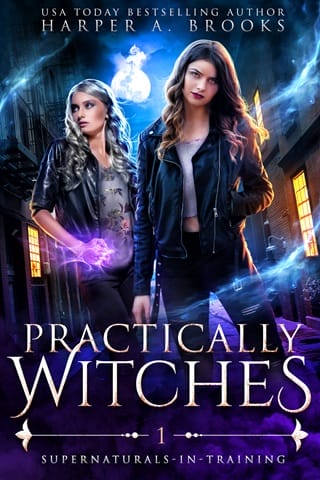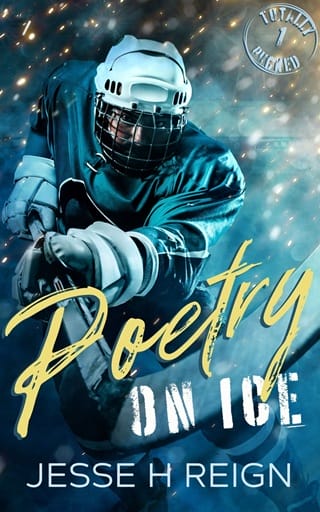Chapter 7
Chapter 7
The next morning, the ache in my hip was worse. I told myself it was from the motel mattress springs stabbing into me as I tried to sleep through the combined noise of the highway traffic and the most definitely not faked cries of pleasure coming from the room next door.
I turned the shower as hot as it would go and stretched under the stream, willing my muscles to loosen. The first event started in the late morning and would be over by mid-afternoon, then I’d have the whole rest of the day to take it easy and recover.
In those days, ice dance competitions kicked off with the compulsory dance, where all teams had to perform the same exact steps—by far my least favorite event; unfortunately, the skating Powers That Be didn’t do away with it until near the end of my career. The original dance, which allowed teams to put their own spin on each season’s required dance style, was better, but I much preferred the final event, the free dance. There, we could choose whatever music and choreography we wanted.
After a scalding shower and lots of warm-up stretches, I made it through our compulsory Quickstep program without too much trouble. I wasn’t able to swing my leg as high as usual, but Heath adjusted his turns so we still had matching lines. Not our best performance, but enough to put us in seventh place.
It wasn’t until the next day, when I was getting dressed for the original, that I noticed the bruise. We didn’t have the funds for fancy costumes, so Heath wore the same nondescript black shirt and trousers for all three programs, while I had one more elaborate dress I saved for the free. My costume for the compulsory and original dances was plain black velvet with spaghetti straps and a slit up the leg—a slit that perfectly framed the furious purple splotch spreading from my hip down toward my knee.
“That looks bad,” Heath said.
“At least we match now,” I pointed out.
I’d been able to conceal the worst of the damage to Heath’s eye, but all the Cover Girl in the world wasn’t going to make the mark on my leg go away. It was obvious even through my thickest tights. My free dance costume was longer—a structured bodice over a gauzy, shredded skirt; I’d DIY’d it from a thrift store prom dress—so I put that on instead, ignoring the sparks of pain that lit up my thigh every time the skirt swished.
The required style for the original dance was Latin ballroom, and our program was a Rhumba to the old standard “Perhaps Perhaps Perhaps”—a mash-up of the Desi Arnaz version and a cover by the band Cake to provide the changes in musical character and tempo the judges wanted to see from a well-balanced program.
Later in our career, the Latin dances would become something of a specialty for us, since they made such good use of our natural chemistry (and plenty of the officials thought Heath had Latin heritage, an assumption he didn’t bother correcting if it boosted our scores). We weren’t as polished back then, but Latin was still one of our best styles. While the Quickstep relied on sharp, controlled movements, the Rhumba required formal carriage in the upper body and more exaggerated, sensual movements in the lower.
Not an ideal combination in my condition. Seconds into our program, Heath could sense how much pain I was in—and I could sense how desperately he wanted to stop and make sure I was all right.
We couldn’t stop. If we stopped, it was all over. So I let the momentum of the steps carry me, and we made it through. As we skated to the boards, Heath looped his arm around my waist, and he kept it there during the walk to the kiss and cry area to wait for our scores. He knew I wouldn’t want anyone to see me limp. Especially not the Lins, who were about to take the ice as part of the final warm-up group.
By the time we made it back to the motel that night, it was snowing so hard we almost drove right past the flickering neon Vacancy sign. And I was in so much agony, I couldn’t get out of the car without Heath’s help. He had to carry me over the threshold like a bride.
While he trudged through snowdrifts to the drugstore across the street, I lay prone on the bed, listening to the wind rattle the flimsy windowpanes and silently panicking.
The sixth-place team had stumbled during their twizzle sequence, and by the end of the original dance, we found ourselves in fifth—right behind Ellis Dean and his partner, Josephine Hayworth. One more event to go, and we were within striking distance of the podium. We’d only have to advance a single spot, since they awarded a pewter medal for fourth place finishers at Nationals in addition to the usual bronze, silver, and gold.
The worst of the pain was coiled around my hip socket, but even the smallest movement sent it slithering out to attack the rest of me. My mother’s ring was typically loose on my finger. Now my hands were so swollen, I couldn’t get it past my knuckle.
Heath returned with snow caked on his eyelashes, bearing Tylenol, a jar of Tiger Balm, and a bag of ice. He alternated between the cold of the ice, the heat of his hands, and the balm’s strange combination of both. Nothing helped.
I hated being taken care of like that, nursed like a helpless child. I’d only let Heath do it once before.
The day my father died.
He always picked us up from the rink on his way home from the college where he taught history. When he failed to show that evening, I told myself he must have forgotten, gotten distracted and lost track of time. As children, Lee and I would often find him sitting in the same place for hours, staring at the wallpaper like he hoped to see our mother’s face in the pattern. It was unspeakably sad, and so we never spoke about it.
Since Heath had come to live with us, though, my father had been better. More present. He even arrived at the rink early sometimes and sat in the stands, watching us skate and chatting with the other parents— who were all mothers rather than fathers. Those women adored him. I suppose he had a certain awkward, absentminded-professor charm.
Nicole let me use the phone in the back office to call him, but there was no answer at his campus number. After an hour had gone by, she gave up and drove us home herself. The house looked dark, but as we drew closer, I saw a single light burning. In my father’s study.
A strange mix of anger and relief swirled through me. I’d been right, he’d forgotten about us. So when we came through the front door, instead of calling out a greeting, I glanced at Heath and laid a finger over my lips. We tiptoed down the hallway.
All we wanted was to sneak up on him, give him a little fright. A petty prank, to pay him back. He’d shout, and then he’d laugh, and we’d be even. He would fix us something to eat—frozen waffles, or macaroniand cheese from a box; my father’s cooking repertoire was not extensive—and he’d let Heath pick dinner music from the record collection. We’d sit around the table talking, like a normal family.
Heath was always envious that I’d grown up with a father and brother and a house to call my own, but the truth was, my family never felt the least bit normal until Heath joined it. Maybe it was their shared affinity for music, or the rapt attention Heath paid during my father’s frequent tangents. Or maybe it was simply that Heath was a child my father could dote on without being haunted by memories of his lost love. All I knew was, Heath’s presence sparked a light in my father’s eyes that I once feared had been snuffed out for good.
The study door had been open only a sliver. I steepled my fingers against the paneled oak and pushed. The hinges screeched, and I cringed. So much for sneaking in undetected.
But my father didn’t move. He was in his favorite broken-down leather chair, facing the bay window; he liked to stare out at the lake while he was thinking. The glow of his banker’s lamp reflected in the glass, showing a mirror image of his face.
Skin pallid. Mouth slack. Eyes wide and staring and empty.
Gone.
The next thing I remember was Heath’s hand on my back, turning me toward him, pressing me close as if we were dancing.
Then, minutes later, or maybe hours: Heath’s fingers squeezing mine as we stood together on the front porch, watching the ambulance pull away. Lights off, no siren. The thing that had been my father zipped into a black bag on the stretcher inside it.
Heath had called the paramedics. He called Lee to tell him the tragic news too, then tucked me into bed and stayed by my side until I fell asleep. When I woke up barely an hour later, sobbing and shaking, Lee still wasn’t there, but Heath hadn’t moved an inch.
When I reached for Heath, he didn’t hesitate. He climbed in beside me under the covers, and I clung to him as if I were suspended over a yawning darkness and he was the only thing keeping me from plummeting down, down, down.
That was the first night we shared a bed. And ever since, I’d had trouble falling asleep without his arms around me. Heath Rocha was there for me when no one else was.
At the motel in Cleveland, I managed to drift off with my cheek pillowed on Heath’s chest and his fingers gently stroking my hair. When I woke up in the morning, the snow had stopped—and my hip was screaming.
Heath took one look at my face and said, “Katarina, you need to see a doctor.”
We both knew we couldn’t afford a doctor. And we knew if we didn’t skate today, it could spell the end of our skating careers. Clawing our way onto any step of the podium was the best hope we had of attracting the attention of sponsors, a better coach, something that would allow us to continue without begging for scraps from my brother.
I thought about Isabella and Garrett Lin, waking refreshed after eight hours cosseted in feather-down luxury at the Ritz-Carlton. Eating egg whites and fresh fruit delivered to them on a literal silver platter. Riding to the arena in a chauffeured car so the slap of the lake-effect wind couldn’t touch them.
People like them didn’t know how to fight. They’d never had to.
I sat up in bed. I put one foot on the grimy chartreuse carpet, then the other. As I pushed myself to standing, Heath flinched like the pain was coursing through his own body.
But he knew better than to try to stop me.
 Fullepub
Fullepub 



